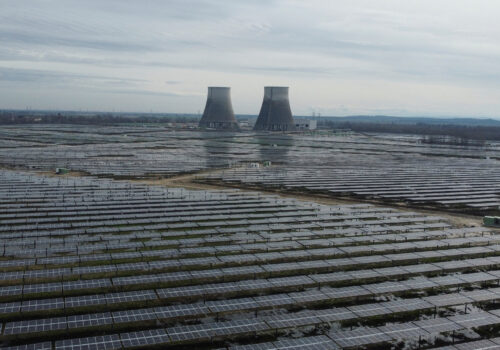What Trump’s return as president means for COP29
BAKU—The twenty-ninth Conference of the Parties to the United Nations Framework Convention on Climate Change, better known as COP29, began on November 11 in Baku, Azerbaijan. The eleven-day conference is an important opportunity to set a new global goal for climate finance and build the momentum urgently needed to protect lives and livelihoods from the effects of climate change. But in light of the election of Donald Trump to a second nonconsecutive term as US president, the pressure is on COP29 in a new way.
On the campaign trail, Trump made his climate plans clear—and they are not currently aligned with global goals and targets. Instead, he has stated that he will again withdraw from the Paris Agreement and end many of the climate policies launched during the Biden administration.
His “America first” approach doesn’t align with the scientific reality of climate change. While Trump has signaled that his administration will put boundaries on its international commitments, the consequences of climate change do not recognize national boundaries.
In recent years, the rising costs of global warming have become increasingly and painfully clear.
With the looming threat of reduced climate commitments from the world’s largest economy (in terms of nominal gross domestic product), the negotiations at COP29 will take on a new significance. In 2016, when Trump was last elected, US negotiators were unable to make strong commitments at COP22 in Marrakesh. While they participated in these negotiations, they were encouraged to avoid any legally binding commitments until the next administration came into office. As the United States begins another transition from one administration to another, the same expectations could be placed on US negotiators this year.
Notably, the outcomes on the New Collective Quantified Goal (NCQG) on Climate Finance will bear the consequences of those expectations. The goal was mandated under the Paris Agreement and officially set at COP15, where developed countries agreed to mobilize $100 billion annually to enable climate action in developing countries. Now, the world is revisiting that $100 billion benchmark since the scope of the climate crisis has dramatically increased since 2009.
With a noncommittal United States, there are two likely scenarios. The first scenario is that the decision on the NCQG is deferred to next year’s COP in Brazil. The second scenario is a new, nonbinding goal that is less ambitious and that will lack a mechanism to enforce it.
In short, the wording will matter. Instead of words like “commit,” the second scenario could result in a new finance goal with more ambiguous language. Nevertheless, it would serve as an important political signal. It could be a reference point that emphasizes the value of the process and the need to accelerate climate finance. It would keep the pressure on governments, ensuring that they recognize their responsibility to mobilize financial resources toward reducing emissions and protecting people from the impacts of climate change. In its ability to set a precedent, the agreement itself can inspire action not only in the public sector but also the private sector. COP negotiators should therefore seek to make the wording that sets this financing goal as strong as possible.
In recent years, the rising costs of global warming have become increasingly and painfully clear. It is in every country’s interest—including the United States’—to increase international financial commitments. After all, every one dollar invested in prevention saves sixteen dollars in disaster response.
As COP29 begins and the world looks ahead to COP30 where substantial commitments are expected, the value of US leadership cannot be overstated. This is not just a moral responsibility, but a survival mechanism. Climate change is a global issue. If the United States refuses to cut emissions further and ends the policies and investments launched under the Biden administration, the Trump administration would put even more Americans’ health, finances, and safety at risk as they face the rapidly intensifying consequences of climate inaction.
Jorge Gastelumendi is the senior director of the Atlantic Council’s Climate Resilience Center.
Further reading
Mon, Oct 7, 2024
Treating the green transition like the geopolitical imperative it is
Report By Carol Schaeffer
Policymakers should adopt a NATO-style approach to long-term decarbonization and work to boost the green economies of the United States and the EU together.
Wed, Nov 6, 2024
Tackling the energy-water challenge at COP29
EnergySource By Robert F. Ichord, Jr.
Energy and water have a complex and inextricable relationship, especially as growing populations, expanding cities, and the changing climate strain resources around the globe. Leaders at COP29 must come together in Baku to promote policies, strategies, and investments to meet the water and energy challenge.
Thu, Jul 25, 2024
The world is sleepwalking into an era of extreme heat. The UN just issued a wake-up call.
New Atlanticist By Eleni Myrivili
The UN secretary-general‘s Global Call to Action on Extreme Heat underscores the urgent need for actionable heat-related policies worldwide.
Image: A worker walks along a fence near the Baku Olympic Stadium, the venue of the COP29 United Nations Climate Change Conference, in Baku, Azerbaijan October 18, 2024. REUTERS/Aziz Karimov/File Photo


